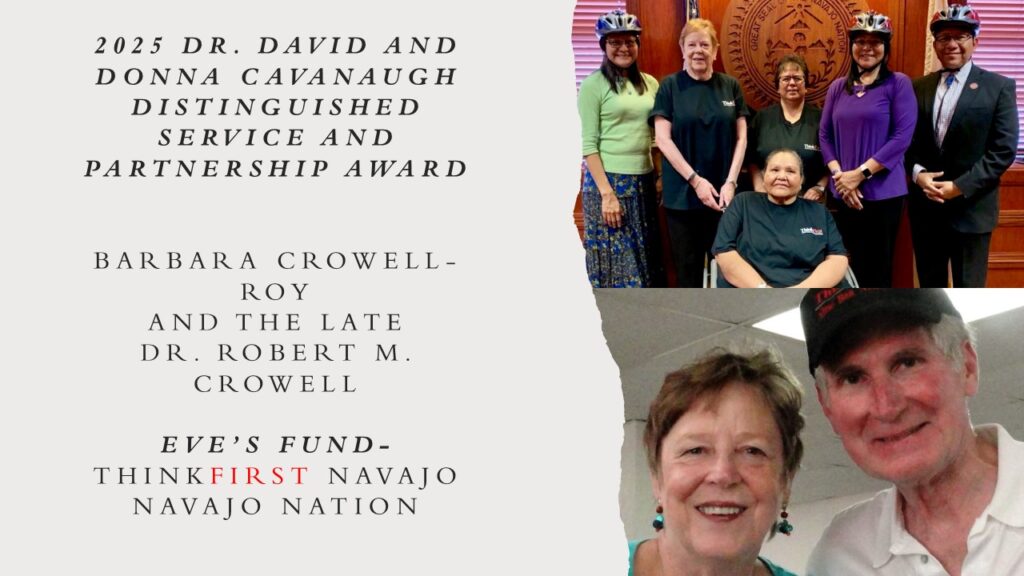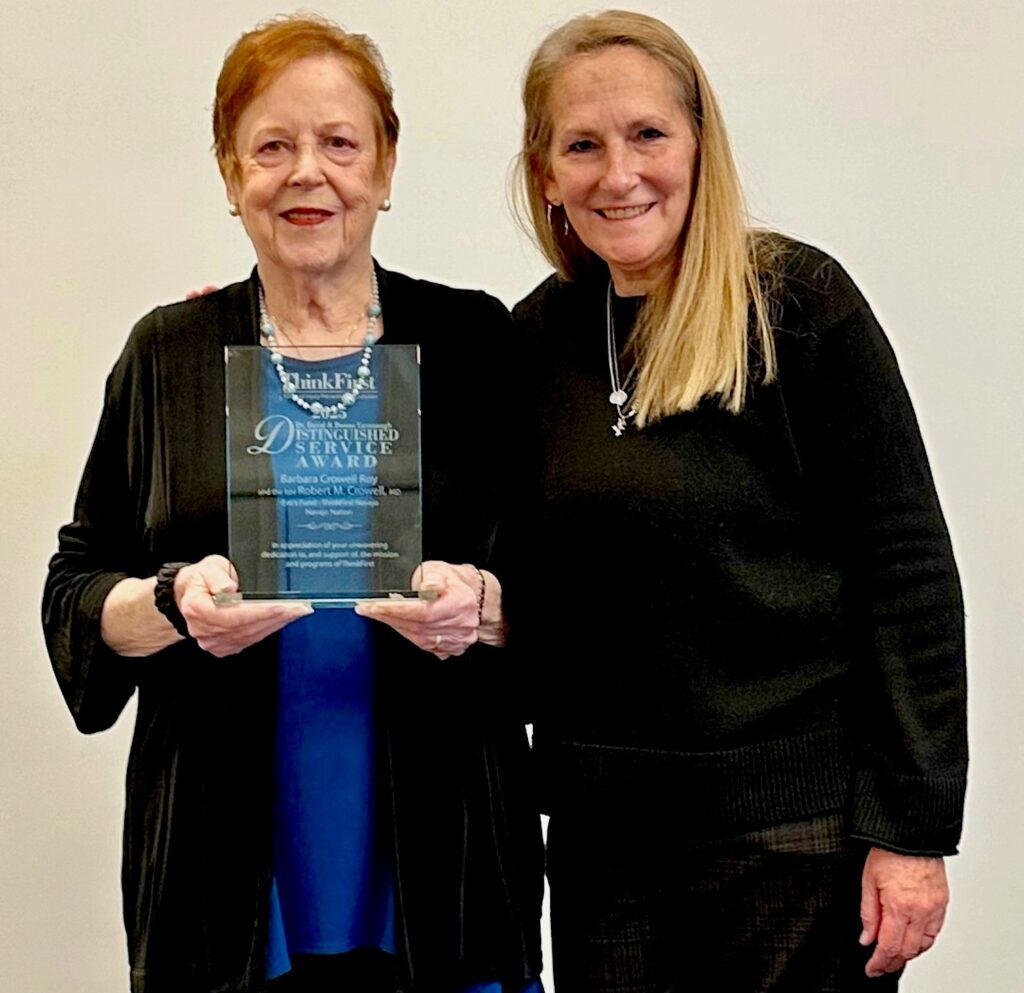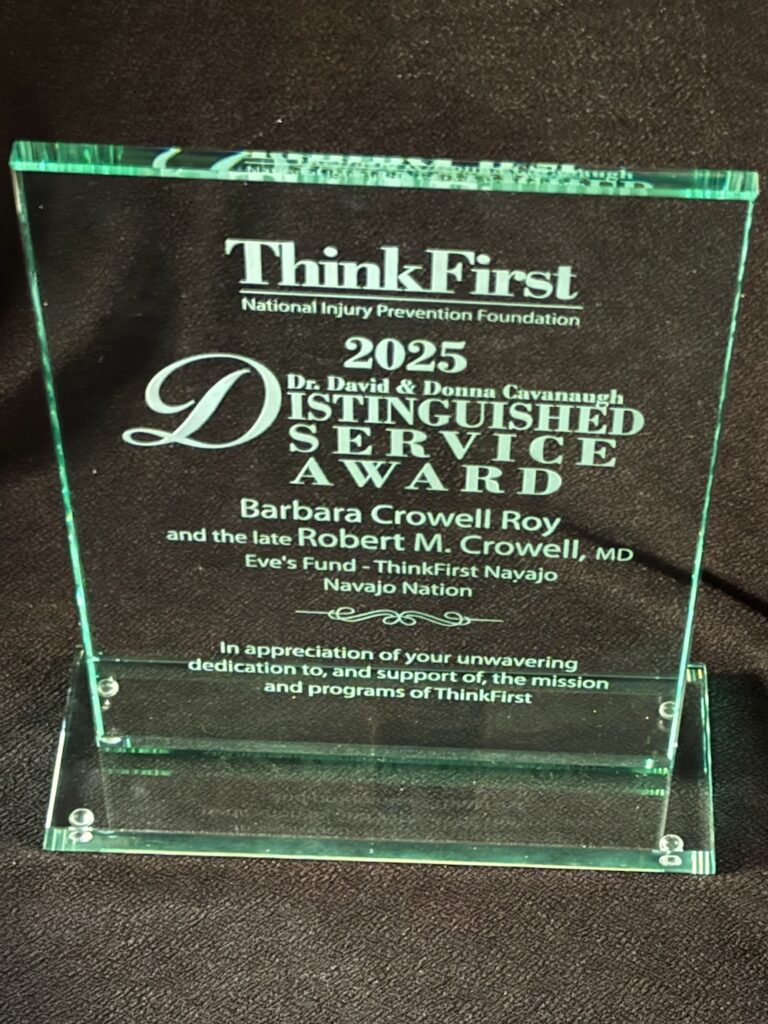
At its annual conference, held on April 14–15 in Boston, the ThinkFirst National Injury Prevention Foundation presented its highest honor. The Dr. David and Donna Cavanaugh Distinguished Service Award was given to Barbara Crowell Roy and Dr. Robert M. Crowell (posthumously). They are the founders of Eve’s Fund for Native American Health Initiatives, which supports health and injury prevention programs.
Two decades of injury prevention education and advocacy

Barbara Crowell Roy accepted the Dr. David and Donna Cavanaugh Distinguished Service Award on April 15, on behalf of herself and her former husband, the late Dr. Robert M. Crowell, from Jill Braselton, Executive Director of ThinkFirst National Injury Prevention Foundation.
This award honors two decades of injury prevention education by Eve’s Fund for Native American Health Initiatives, also known as Eve’s Fund. Their flagship program, ThinkFirst Navajo, is based in Farmington, New Mexico, and focuses on youth injury prevention in Native communities. The Crowell’s work reflects the compassionate, community-centered legacy of Dr. David and Donna Cavanaugh, namesakes of the award and founders of ThinkFirst Shreveport.

After losing their daughter Eve Erin Crowell in 2005, Barbara Crowell Roy and Bob Crowell turned grief into a mission of health and prevention. Barbara, a registered nurse and educator, and Bob, a respected neurosurgeon, created programs to empower and protect Native youth through education and advocacy.
ThinkFirst Navajo Injury Prevention Program
Understanding the high rates of preventable injuries and deaths among Navajo youth, they launched ThinkFirst Navajo—a culturally grounded chapter of the national ThinkFirst program. It is the only ThinkFirst chapter in the U.S. that operates exclusively on a federally designated Native American reservation.
Since its founding, the program has reached nearly 70,000 K–12 students with evidence-based education on injury prevention. ThinkFirst Navajo has also distributed thousands of safety helmets and car seats to families on and near the Navajo Nation. The ThinkFirst program includes “Voices for Injury Prevention” (VIPs), where people with life-changing injuries share their stories of resilience and recovery with youth.
In retirement, Barbara and Bob volunteered their time and expertise to improve safety and quality of life in underserved Native communities. They also supported individuals living with disabilities through education and advocacy. Their ability to turn a personal loss into purpose reflects Dr. Cavanaugh’s tireless national advocacy for injury prevention.
Understanding the disproportionate rates of preventable injuries and deaths, especially among children and adolescents on the Navajo Nation, they launched ThinkFirst Navajo — a culturally grounded chapter of the national ThinkFirst program and the only one in the United States operating exclusively on a federally designated Native American reservation.
Eve’s Fund’s expanded programs
Under Barbara’s leadership, Eve’s Fund has expanded to include literacy programs, mental health advocacy, and educational scholarships for Native youth and families. These efforts have deepened the organization’s impact and broadened its reach within Native communities. After Dr. Crowell’s passing in 2020, Barbara continued their mission with unwavering dedication. She writes, speaks, and builds meaningful partnerships across Indian Country to advance health, safety, and opportunity. Her message continues to resonate:
“Anything can happen to anyone at any time; you just never think it’s going to happen to you — until it does.”
About ThinkFirst National Injury Prevention Foundation.
Founded by neurosurgeons in 1986, ThinkFirst’s mission is to prevent brain, spinal cord, and other injuries through education, research, and advocacy. Traumatic injury remains a leading cause of death and disability for children, teens, and adults across the country. Common causes of these injuries include motor vehicle crashes, violence, falls, and sports-related accidents. Simple safety actions can significantly reduce risk—like wearing seat belts, avoiding distracted or impaired driving, and using bike or sports helmets. To learn more, visit ThinkFirst.org
Sign up for our E-Newsletter today!
Don’t Miss Out!
We promise not to share your information with anyone. You have our word!

